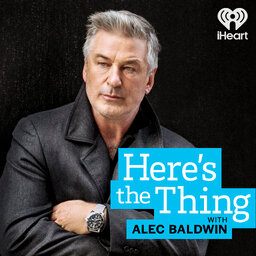James Burrows: Like Father, Like Son
Television director James Burrows has been working since the 1970s on beloved series like Taxi, Cheers, Friends, Frasier, and Will & Grace. He has directed over 1,000 hours of television, co-created the long-running, critically-acclaimed series Cheers and is the recipient of 11 Emmy Awards and a DGA Lifetime Achievement Award. His golden touch becomes apparent when you consider that a staggering 75 of the series pilots he directed, including The Big Bang Theory and Two and a Half Men, advanced to series. His new book, the memoir “Directed by James Burrows,” details his accomplished life and career. James Burrows and Alec discuss their favorite parts of working together, how Burrows got his start in the entertainment industry and why his book is ultimately about kindness.
In 1 playlist(s)
Here's The Thing with Alec Baldwin
Award-winning actor Alec Baldwin takes listeners into the lives of artists, policy makers and perfor…Social links
Follow podcast
Recent clips

From the Archives: Anjelica Huston on Modeling, Movie-Making, and a Life in the Spotlight
48:25

The Fearless Robbie Kaplan
42:32

From The Archives: Don Lemon Writes About God
47:11
 Here's The Thing with Alec Baldwin
Here's The Thing with Alec Baldwin